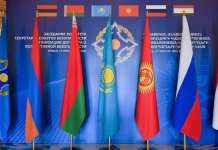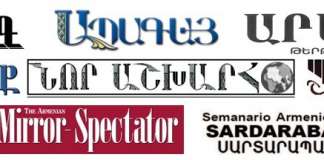The Zoryan Institute has issued an open letter to the Rabbinical Centre of Europe (RCE). The open letter reads as follows:
As a non-profit organization dedicated to genocide and human rights studies since 1982, the International Institute for Genocide and Human Rights Studies (“IIGHRS”, A Division of the Zoryan Institute) is deeply concerned about and takes great issue with the open joint letter that was released by the RCE signed by 50 senior leading European Rabbis.
We recognize that we are currently living in a time where antisemitism is at historically high levels. We also condemn the recent trend in which Holocaust imagery and language have been misappropriated, especially regarding the COVID-19 pandemic. We would like to point out, however, that the word “genocide”, coined by Jewish scholar Raphael Lemkin in 1943/1944, was adopted into law in 1948, many years after the Armenian Genocide and as a result of the Shoah. Article II of the 1948 Genocide Convention states:
Genocide means any of the following acts committed with intent to destroy, in whole or in part, a national, ethnical, racial, or religious group, as such:
- Killing members of the group;
- Causing serious bodily or mental harm to members of the group;
- Deliberately inflicting on the group conditions of life calculated to bring about its physical destruction in whole or in part;
- Imposing measures intended to prevent births within the group;
- Forcibly transferring children of the group to another group.
Kindly note that the above definition of the crime of genocide does not include any reference to the number of people who perished, or the magnitude of suffering, but rather to the intent behind the destruction of a group. According to this definition, the Srebrenica massacres (8,000 victims), the Genocide in Rwanda (800,000 victims), the Cambodian Genocide (2 million people), the Shoah (6 million people), and the Armenian Genocide (1.5 million), are all widely understood as constituting genocide under the definition of the Genocide Convention. Applying this term to the current situation in Nagorno-Karabakh is fully in accord with the scholarly and legal understandings of genocide and in no way trivializes or diminishes the Holocaust or any other example of genocide. In fact, various legal scholars such as former prosecutor of the International Criminal Court Luis Moreno Ocampo, as well as genocide scholars have described the situation in Nagorno-Karabakh as constituting genocide. The situation there is not a simple ‘political disagreement’ as was described in your letter.
We hope that the RCE can appreciate that the phenomenon of genocide is not unique to any one group, nation, religion, or ethnicity. The attempted destruction of an entire population is a crime against all humanity and must be recognized as such no matter who the victim group may be. In our view, genocide is a shared human experience, and unfortunately, this heinous crime has impacted many groups throughout history, and continues to do so in various parts of the world today. This includes Nagorno-Karabakh, whereby a government is deliberately inflicting conditions of life calculated to bring about another group’s physical destruction, which is one of the acts of genocide defined in Article II of the Convention listed above.
The Zoryan institute, by teaching genocide comparatively, and by recognizing the destruction, trauma and pain that this crime inflicts, seeks not to prioritize one case over another, but rather deepen our understanding about the common patterns and dynamics that allow genocide to take place and allow us to more effectively prevent future instances of genocide moving forward. Our goal is to educate and teach about genocide in order to work towards a safer and more just world.
We cordially invite you to better acquaint yourselves with the ongoing situation in Nagorno-Karabakh and encourage you to read the recently published edition of the Zoryan Institute academic journal, Genocide Studies International, published by the University of Toronto Press that is devoted to this particular crisis.
We would be happy to send you a physical copy of this issue for your reference.
















